Summer Resolutions
Every January 1st, people across the world set new goals and plans for themselves—resolutions for the new year. The joke is that we abandon our goals by February and go right back to our regular bad habits. To be realistic, this joke is the definition of “it’s funny because it’s true.” But why restrict resolutions to one point in the year? For many of us, turning over a new leaf happens consistently throughout the year; be it by the calendar, the seasons, or an unscheduled epiphany.
In my own experience, my leaf turning has been inspired by all three of those things. Some Sundays start off a new round of resolutions for my weekly routines. Sometimes the fall of snow reminds me of winter activities I want to participate more in this time around. And sometimes, much like the other average college students I call my peers, I take a look at my life and think “what the hell am I doing?”
And now, my favorite season has come along. Yes, summer has arrived, and with it, a few epiphanies and several resolutions. I’m not the type to quantify my resolutions—there will be no “lose 10 pounds” goal, but rather a “go to the gym [X] amount of times a week” goal. My goals revolve on making myself a happier, healthier, more thoughtful person. Which is why books are the perfect way to help. Reading is engaging, helpful, and calming. If my Summer inspired journey sounds like one you’d like to take, here are some books to guide you.
The Body Is Not an Apology
The Power of Radical Self-Love
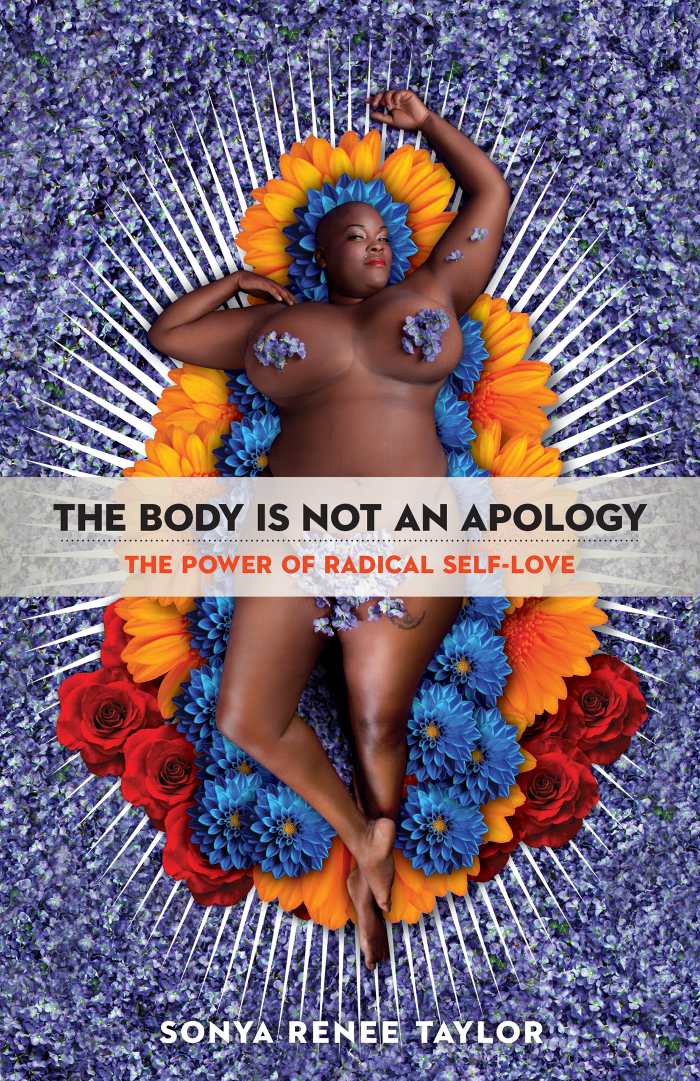
Sonya Renee Taylor
Berrett-Koehler Publishers
Softcover $17.95 (168pp)
978-1-62656-976-8
This marvelous manifesto on radical self-love is life altering—required reading for anyone who struggles with body image.
“Survival is damn hard,” Sonya Renee Taylor says in the introduction to her marvelous new book, The Body Is Not an Apology. A writer, poet, educator, and performer, Taylor brings the message that self-sacrifice and self-flagellation keep us from our highest good. Her manifesto on radical self-love is life altering—required reading for anyone who struggles with body image.
Radical self-love—now a mainstream concept that manifests as a celebration of physical, sexual, and psychological diversity—is laid out clearly in The Body Is Not an Apology. Taylor asks the question: What could you do if you weren’t ashamed of yourself?
Using personal stories, examples from other writers, and data, Taylor makes a compelling argument for dismantling “notions of body-based hierarchies.” The idea that one person is inherently better than another because of the way they look, function, or move oppresses everyone, Taylor says. By examining our identities and the way we relate to ourselves, we’re able to see what messages we’ve internalized. The negative ones, she says, have got to go if we’re going to grow.
To accomplish this, Taylor offers a series of questions to explore the origins of shame and self-hatred, as well as a toolbox of techniques for addressing them in daily life. Throughout the book, “unapologetic inquiries” challenge deeply held beliefs about why you feel the way you do. “Radical reflections” condense each section’s message into a mantra or new perspective.
The Body Is Not an Apology is, in many ways, a cap on Taylor’s previous work at the intersection of body positivity and social justice. The phrase came to her in 2010, following a conversation with a friend. She later founded a digital media and education company of the same name. Self-love is about global transformation—self-help on a much more ambitious scale. After all, social justice starts with the self.
“I am a human being living in a world that still profits from body shame,” Taylor says. Still: we can change ourselves—and, in the process, alter the world.
CLAIRE FOSTER (December 27, 2017)
The Self-Care Cookbook
A Holistic Approach to Cooking, Eating, and Living Well
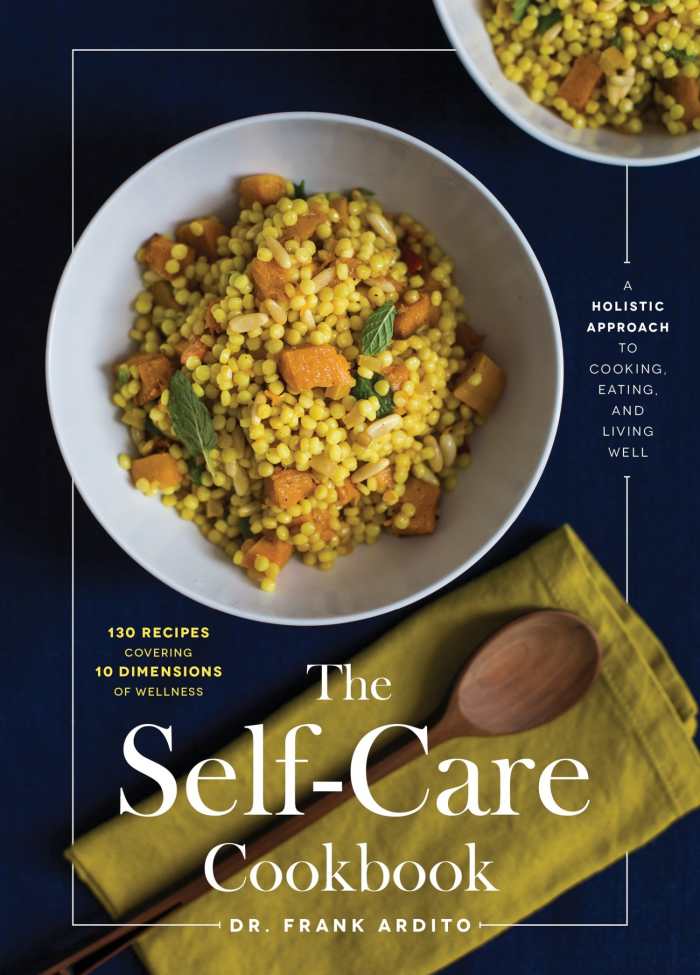
Frank Ardito
Agate Surrey
Hardcover $24.95 (288pp)
978-1-57284-229-8
Buy: Local Bookstore (Bookshop)
“One of the most important parts of our daily lives is our relationship with food,” writes Dr. Frank Ardito. But this relationship can get complicated; according to Ardito, studies have suggested that we make over two hundred decisions about food every day. His book simplifies the task and provides a guide for busy individuals who see a healthy relationship with food as a way to enhance their personal wellness.
Identifying ten different dimensions of the human being, Ardito shows how each dimension has its own changing and evolving needs and expressions. He explains why it’s important to nourish the whole person by becoming attentive to these dimensions and eating to support wellness in each of them. He offers tasty recipes for appetizers, soups, salads, main dishes, and desserts, all made with foods that best support personal well being.
Feeling stressed? Head over to the emotional-wellness chapter for delicious comfort foods. When money is tight, the chapter on financial wellness offers creative ways to enjoy satisfying, tasty meals on a budget. Want to celebrate? Recipes that feed the soul’s need for fun while supporting health are included—yes, even some that embrace fat and sugar. Pastas, meats, and vegetarian options are also included.
Ardito writes, “Let’s face it. You can choose not to diet, you can choose not to exercise, but you must eat. So, why not choose to eat well?” Recipes for palate-pleasing dishes like Roast Pork with Pomegranate Salsa, Quinoa Pilaf with Walnuts, and No-Bake Crustless Cheesecake with Balsamic Berries prove that cooking and eating for health and wellness needn’t be boring.
KRISTINE MORRIS (October 27, 2017)
The Mindful Way to a Good Night’s Sleep
Discover How to Use Dreamwork, Meditation, and Journaling to Sleep Deeply and Wake Up Well
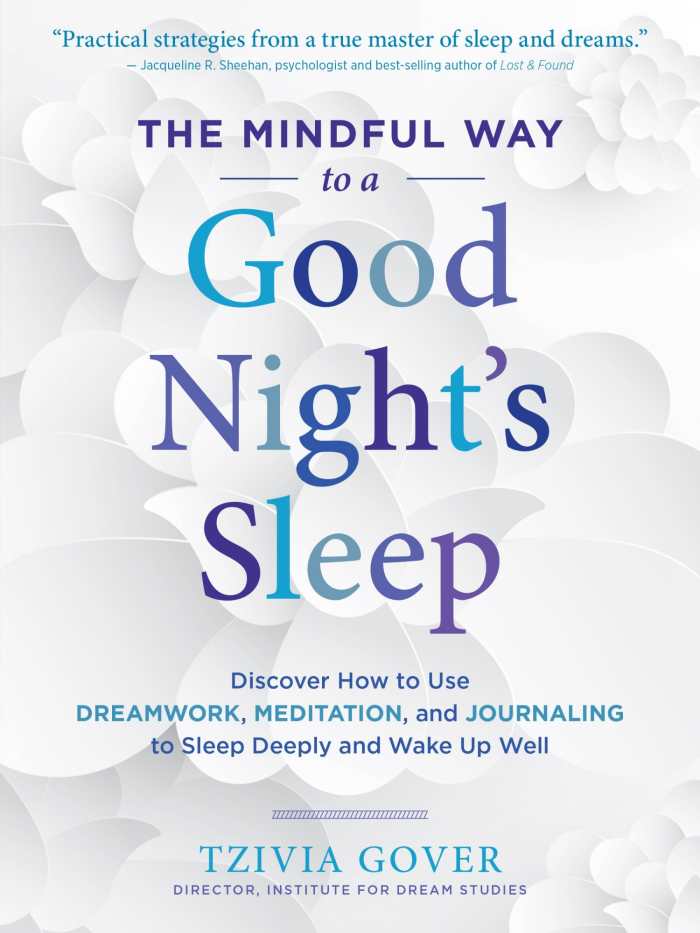
Tzivia Gover
Storey Publishing
Softcover $16.95 (192pp)
978-1-61212-882-5
Buy: Local Bookstore (Bookshop)
As a child, Tzivia Gover was afraid of the dark; even with her door open and the hall lights on, she had difficulty falling asleep. Once asleep, she was haunted by nightmares. Now, having learned to turn and face her fears, she writes that her dreams have become allies that bring beauty, wisdom, and love into her life.
Gover explores sleep, dreams, and waking as a continuous process in which each state of consciousness contributes to a meaningful, healthy, and joyful life. She suggests we begin dealing with our sleep issues by treating ourselves as gently as we would a small child—asking ourselves what might bring us comfort. Maybe a soft blanket and sleepwear that caresses the skin, soothing music, or relaxing reading would do the trick. And no, your laptop is not a teddy bear. Electronic devices “emit a glow that interferes with melatonin production, inhibiting our natural rhythms of sleep and waking,” she writes.
Gover suggests turning your bedroom into a “worry-free zone”—a sanctuary that nourishes all the senses. To encourage exploration of the mysterious world of sleep and dreams, she recommends keeping a journal nearby (a soft night-light will keep you from being blasted into full wakefulness as you write); for encouragement, she provides brief journaling exercises and prompts.
Gover’s approach to sleep and to waking up, both literally and metaphorically, is gentle, insightful, and mindful. Her beautifully designed book is packed with up-to-date research and information on dream interpretation, journaling, navigating nightmares, lucid dreaming, and creative approaches to sleep problems, but it’s also a sweet, tender book. Gift it to someone you love—it will touch the recipient’s heart, and may help him or her enjoy many nights of deep, restful sleep.
KRISTINE MORRIS (October 27, 2017)
Yoga Rising
30 Empowering Stories from Yoga Renegades for Every Body
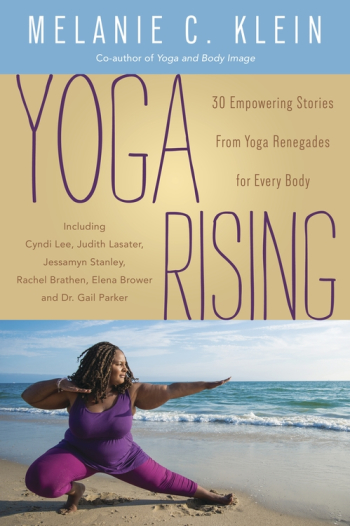
Melanie C. Klein
Llewellyn Publications
Softcover $17.99 (336pp)
978-0-7387-5082-8
Yoga Rising is an affirming and orienting anthology that addresses western yoga culture’s issues with body image and more.
Yoga Rising is Melanie C. Klein’s welcoming compilation in which thirty voices address issues of body image within western yoga culture.
Paired with strong philosophy and a willingness for serious self-inquiry, Yoga Rising is poised to be a valuable contribution to any yoga teacher training program. Its personal narratives have the potential to be eye-opening to a population that frequently benefits from thin privilege, informing their teaching in a significant way.
There are some real gems among these essays. Lakshmi Nair’s no-holds-barred assessment of the yoga scene is gloriously challenging, gently laying out issues of commercialism, cultural appropriation, and spiritual bypassing. In the same section, which is devoted to intersectional yoga experiences and is by far the richest portion of the book, Chanelle John offers frameworks for dismantling oppression through much-needed alternatives to the yoga studio model.
Interestingly, the third section of the book includes the fewest questions for thought, though it offers much of the most challenging material. Magic strikes again in the book’s fifth section, which opens with Yoga Journal founder Judith Lasater’s intense self-reflection and astute insights on the evolving state of yoga in the West. The book awakens a hunger for more such richness.
The book sometimes falls short in connecting awareness to action. Especially in the first part of the book, it seems as though Suzannah Neufeld’s cultural observation about how well acquainted we are with “the story of the young white woman using yoga as a path to healing” has not been heeded as cautionary.
Snippets of deep insight exist in every essay, though early on, the book seems to focus on more familiar narratives, missing the opportunity to challenge cultural issues such as under-trained teachers and a capitalism-driven studio system.
For those sensing that western yoga culture has work to do in the arena of body image, or those working through similar stories, Yoga Rising is an affirming and orienting anthology. Hopefully it reaches enough hands to springboard the community toward further inquiry and informed practice.
JESSIE HORNESS (December 27, 2017)
Your Guide to Forest Bathing
Experience the Healing Power of Nature
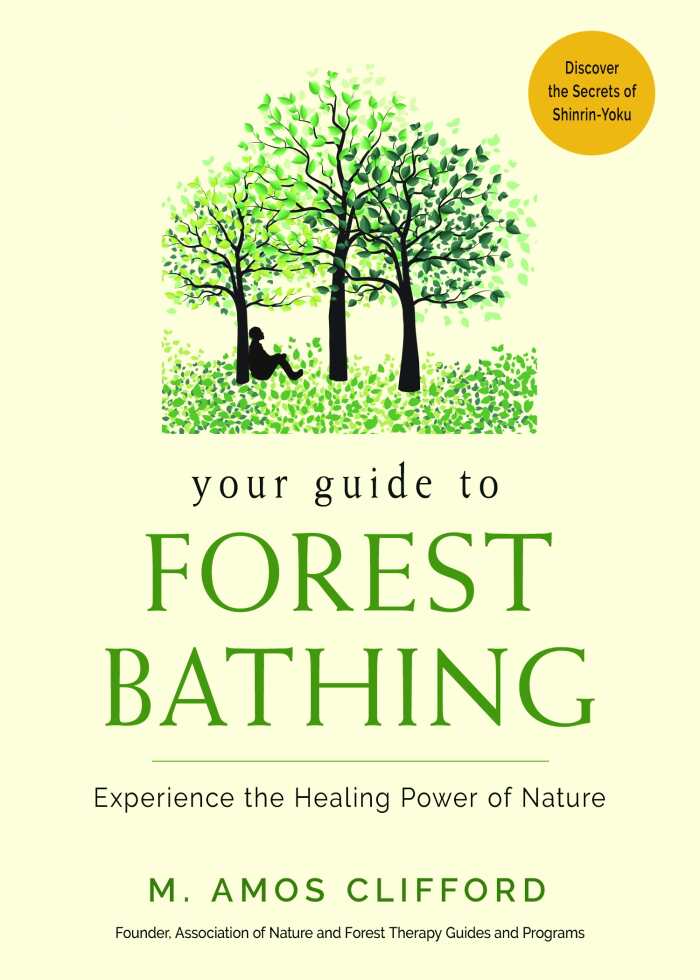
M. Amos Clifford
Conari Press
Softcover $14.95 (192pp)
978-1-57324-738-2
Deeply encoded in the human psyche is the awareness that comfort, peace, and healing can be found in a forest. The Japanese have a term for this: shinrin-yoku, or “forest bathing.” They have long understood that being in a forest is to immerse oneself in grace and beauty and to feel the healing power that exists in the exhalations of the trees.
M. Amos Clifford is a forest guide, psychotherapist, restorative justice worker, and longtime Zen meditation practitioner. His book is a beautiful exploration of forest bathing, a source of information on the medical and scientific evidence of its benefits, and a guide to all that’s needed for a fulfilling forest-bathing practice.
Evolutionary adaptation has not kept up with the rapid pace of change, leaving us vulnerable to stress, physical and mental illness, and fractured relationships with each other and with the natural world. Trees are slow, patient beings; keepers of history, they remind us of a slower, gentler way to live. “Forest bathing resets our nervous systems,” Clifford writes. “It does so quickly and effectively. It is as if we have come home.”
The benefits are reciprocal: we exhale the carbon dioxide that the trees breathe and in turn inhale their exhalations, shown by research to be a “rich mix of freshly minted oxygen and other aerosols that benefit our moods, our hearts, our mental capacities, our immune systems, and more.”
Estranged from the natural world, we’ve come to view trees as ornamental or as crops to be harvested for a price, but Clifford affirms that, deep in our DNA, we remember the power, beauty, and generosity of trees. “We deeply intuit that it is our birthright to recall their songs,” he writes.
KRISTINE MORRIS (April 27, 2018)
In Praise of Difficult Women
Life Lessons From 29 Heroines Who Dared to Break the Rules
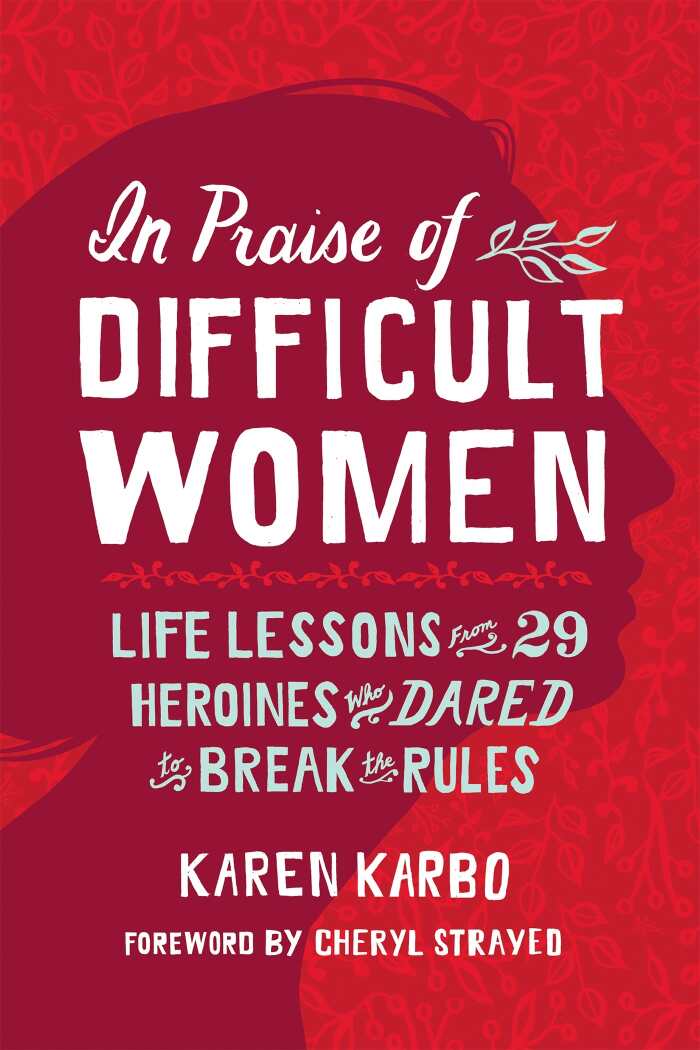
Karen Karbo
Cheryl Strayed, contributor
National Geographic
Hardcover $26.00 (352pp)
978-1-4262-1774-6
Karen Karbo’s In Praise of Difficult Women collects twenty-nine biographical profiles of women who have pushed back, broken the mold, or simply lived on their own terms. The women chosen are eclectic, while the narrative is researched and informed yet conversationally welcoming.
Among Karbo’s distinctive roster are icons like Coco Chanel, Frida Kahlo, and Josephine Baker, and political forces Eva Perón, Angela Merkel, and Hillary Clinton. Aviation pioneer Amelia Earhart is included, as well as writer Martha Gellhorn, whose perilous work as a war correspondent was preferable to her than her combative marriage to Ernest Hemingway.
Karbo’s fondness for rule breakers and benders is clear, and she defends them through character quirks and missteps—real women lead real and flawed lives. Certain profiles have extra verve, such as that of Justice Ruth Bader Ginsburg, who at eighty-five still works out in the Supreme Court gym, wears stylish collars to accessorize her formal black robe, and is brilliant yet accessible enough to merit the nickname Notorious RBG.
Karbo’s Janis Joplin is feisty and poignant—not a “dulcet” 1960s folk songstress, but more of a “monster truck with a broken muffler hauling ass down a … Southern road.” Carrie Fisher is also featured, her wit, vulnerability, and excess far more intriguing than her eternally hyped Princess Leia of Star Wars role.
Though the list is diverse, a common trait among Karbo’s forthright females is being true to one’s soul—for better or worse, but generally better. In Praise of Difficult Women offers many words of wisdom, including sage advice from fashion titan Diana Vreeland, who noted that the only right life to live is “the one you know you want, and you make it for yourself.”
MEG NOLA (December 27, 2017)
Swell
A Sailing Surfer’s Voyage of Awakening

Liz Clark
Daniella Manini, illustrator
Patagonia
Hardcover $35.00 (320pp)
978-1-938340-54-3
Buy: Local Bookstore (Bookshop)
A series of serendipitous events, a generous mentor, and lots of hard work made it possible for young Liz Clark to fulfill her childhood dream of sailing and surfing around the world. But sailing Swell out of San Diego and watching her loved ones blur into the hazy winter skyline, she questioned the wisdom of undertaking a journey that would test her on all levels, and maybe even break her.
On dark nights alone at sea, Clark was often saved from a descent into depression by the beauty and sacredness of the life around her—in the poor fishermen who shared their catches with her, or a group of dolphins trailing phosphorescence in their wake. Physical, mental, emotional, financial, and relationship difficulties would bring her near collapse, but then her spirits would be lifted by the sea’s vast horizon, the amazing rush of surfing, the smile of a friend, or the belief that she could somehow make a difference. She who used to panic at the thought of spending a Saturday night alone came to find solitude delightful, satisfying deep hungers.
There were violent storms with wind, waves, and lightning that rocked her to her core; she cooked at a 65-degree angle while stuck on a sandbar; she survived a scary, abusive relationship; she struggled with boat repairs; she panicked at the end of her sponsorship agreement; and she had a near run-in with Colombian drug runners in Panama. Material poverty was everywhere, as was pollution amidst the beauty; she pondered the ability of humans to destroy that which sustains them.
In mastering the discipline needed for a journey where “one lazy decision can mean losing everything,” Clark came to love herself just as she was, and to know that, in choosing love, she would never feel lack.
KRISTINE MORRIS (December 27, 2017)
Hannah Hohman
